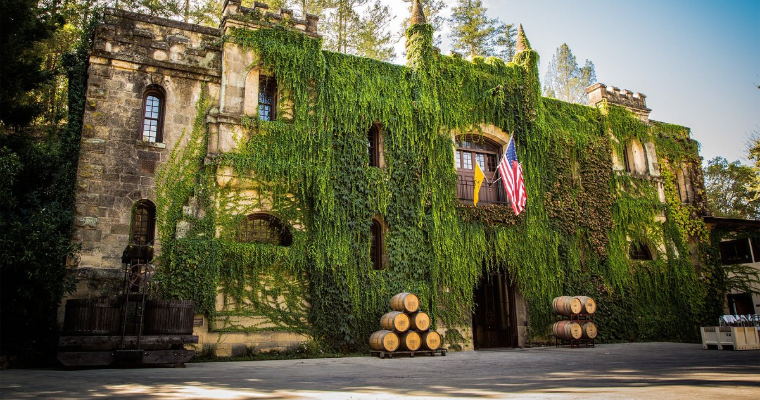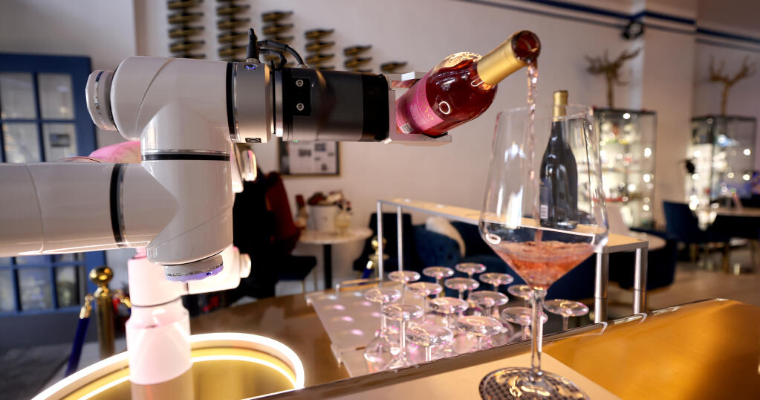Final
Deadline
April 16, 2026
Judging
Date
May 18, 2026
Winners
Announced
June 10, 2026

At first look, it might appear unusual to combine modern technology with age-old winemaking techniques. However, the wine industry is rapidly embracing artificial intelligence (AI), leveraging data and machine learning to enhance productivity, improve wine quality, and streamline processes. In this article, Sommeliers Choice Awards discusses the increasing influence of artificial intelligence technologies in wineries, their effects on vineyard operations, and the advantages and disadvantages of this technical integration in this article.
AI is transforming the very foundation of winemaking: the vineyard. Traditionally, vineyard management has relied heavily on human expertise and experience to monitor soil health, weather conditions, and grape growth. However, with the introduction of AI, these processes are becoming more data-driven and precise.
AI-powered smart agriculture is now being used to optimize grape-growing conditions. By deploying sensors across the vineyard, AI systems collect vast amounts of data on factors like soil moisture, sunlight exposure, temperature, and nutrient levels. Machine learning algorithms then analyze this data and predict future weather patterns, suggesting optimal irrigation times, nutrient treatments, and harvest windows. This not only improves grape yield but also ensures that the vines are treated with the care needed to produce the best possible grapes. VineView, a California-based startup, utilizes AI to analyze aerial imagery of vineyards, providing invaluable insights into vine health, irrigation needs, and disease prevention. By processing these images, AI can detect early signs of disease or nutrient deficiencies, allowing vineyard managers to take corrective actions before significant damage occurs. This can result in improved yield, reduced environmental impact, and ultimately, higher-quality wine.
Also read: Machine Intelligence and the Future of the Wine Industry
The benefits of using AI in vineyard management are clear. It allows wineries to make data-backed decisions, reducing reliance on guesswork and intuition. Additionally, AI enhances sustainability efforts by minimizing the use of water, fertilizers, and pesticides, contributing to more eco-friendly practices. However, the integration of AI into vineyard management isn’t without its challenges. While the technology offers precision, it requires significant upfront investment in infrastructure, such as sensors, drones, and data analysis software. Moreover, the reliance on AI could lead to a reduction in human oversight, which may cause issues when unforeseen circumstances arise that AI cannot predict accurately. As Dr. Albert Strever from Stellenbosch University told South Africa Wine NPC, “AI can summarize and combine data well, but it lacks logic.” Therefore, human expertise is still crucial to ensure that AI recommendations align with the real-world context of the vineyard.
Once the grapes are harvested, AI continues to play a significant role in the winemaking process. The intricate art of fermentation—when yeast breaks down sugars into alcohol and carbon dioxide—has historically been closely monitored by winemakers who relied on experience and instinct. Today, AI helps wineries maintain consistency and optimize fermentation conditions.

Image: Chateau Montelena, known for using AI in its winemaking process
According to a joint survey conducted by The Wine Market Council with WineBusiness Monthly, AI can analyze historical and real-time data during fermentation, including temperature, yeast activity, and sugar levels. By comparing this data with previous vintages, AI can recommend the optimal time to press the grapes or transfer wine to barrels. This reduces the risk of human error and ensures that each batch of wine is crafted to perfection. E. & J. Gallo Winery employs AI to monitor fermentation conditions in real time. This AI-driven system helps the winery maintain consistency across its various wine labels and increase production efficiency. AI not only speeds up the fermentation process but also ensures that wine quality remains high, regardless of external variables like weather and labor fluctuations.
AI in the winemaking process can greatly enhance productivity by reducing human labor and increasing production consistency. It allows winemakers to monitor and adjust variables that could affect the wine quality in real-time, ensuring that even subtle changes are accounted for. However, one potential downside is the over-reliance on technology, which could lead to a loss of craftsmanship in winemaking. While AI can enhance certain technical aspects, it cannot replicate the intuition and sensory judgment of experienced winemakers. As Dr. Strever points out, AI cannot replace human expertise, especially when it comes to understanding the finer nuances of wine flavor and aroma.
For wine enthusiasts, choosing the right bottle can often be a daunting task. This is where AI has made significant strides in simplifying the process. AI-powered wine apps and virtual sommeliers are revolutionizing the way consumers discover and enjoy wine.
Also read: AI-Powered Sommeliers: Revolutionizing Wine Sales and Enhancing Wine Experience
AI algorithms can sift through vast amounts of wine data—ranging from flavor profiles and reviews to user preferences—and offer personalized recommendations. Machine learning models analyze user behavior, such as past wine choices and ratings, to predict which wines are likely to match their tastes. Vivino, a popular wine app, uses AI to provide tailored suggestions based on user preferences. The app allows users to scan wine labels or wine lists, instantly providing ratings, reviews, and details about the wine, such as price and flavor profile. This democratizes wine knowledge, enabling consumers to make informed choices, even if they are not wine experts.
AI’s role extends to enhancing the wine-drinking experience itself. For example, AI-driven virtual sommeliers can recommend food pairings, optimal serving temperatures, and even suggest tasting orders. Technologies like MyOeno—a smart scanner that analyzes wine characteristics—take personalization to the next level by offering real-time suggestions for similar wines and food pairings. These AI tools not only improve the consumer’s overall wine experience but also make wine more accessible to those who may have previously found it intimidating.

Image: RobinoVino: The First Robot Sommelier for Wine Tasting (source: North Bay Business Journal)
While AI offers numerous advantages, its integration into the wine industry raises several ethical concerns. One of the primary issues is bias—AI is only as objective as the data it’s trained on. If the data is flawed or lacks diversity, AI systems may perpetuate existing biases. This is particularly important in regions like South Africa, where fostering inclusivity and diversity is a central goal in the wine industry.
AI systems thrive on data, making transparency in data collection and usage a critical issue. Vineyard operators must ensure that consumer and production data are collected responsibly and securely. Transparency about how data is used and shared is vital to building consumer trust and maintaining ethical standards in the industry. Moreover, wineries must safeguard data against cybersecurity threats to protect consumer privacy and avoid potential security breaches.
Looking ahead, the role of AI in the wine industry is only set to expand. From improving sustainability practices in vineyards to offering more personalized wine experiences for consumers, AI is poised to play a critical role in the future of winemaking. However, it’s essential that wineries strike a balance between AI and human expertise. While AI can optimize processes and reduce inefficiencies, it can never replace the creativity, passion, and intuition of the winemaker. Rather than replacing tradition, AI should complement it, offering winemakers the tools to refine their craft while respecting the age-old traditions that make wine such a timeless beverage.
[[relatedPurchasesItems-61]]
AI technologies are transforming the wine industry, transforming everything from vineyard management to the consumer experience. While the integration of AI brings numerous benefits, including increased efficiency, higher-quality wines, and personalized experiences, it also presents challenges such as the potential for bias, data privacy concerns, and the risk of over-reliance on technology. For the wine industry to harness the full potential of AI, it must find a delicate balance between innovation and tradition, ensuring that the artistry of winemaking remains at the heart of the process. As wineries continue to explore AI’s capabilities, it is clear that the future of wine is being shaped by the intelligent fusion of technology and human expertise.
Header image sourced from Domaine André Brunel
Related Links
A few seconds is all it needs
Top Wine Trends That ChatGPT Predicts
Enter your Wines now and get in front of top Sommeliers, Wine Directors, and On-Premise Wine Buyers of USA.
